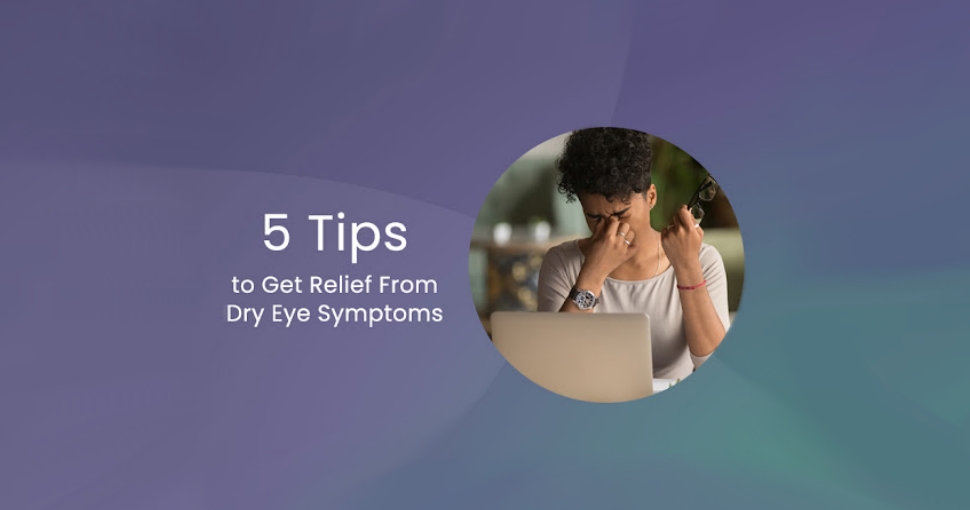Five Remedies for Dry Eye Relief

Dry eyes are very common—so common that you may not even realize some of the irritating eye symptoms that you are experiencing are due to dry eyes. Dry eye symptoms, such as a burning or stinging sensation, eye fatigue, redness, and watery eyes, can all be due to dry eye disease, which occurs when your eyes do not produce enough tears to keep your eyes hydrated or when the tear film evaporates too quickly.1
The good news is that there are many remedies that can help relieve chronic dry eye symptoms. Here are five steps to take when dry eyes are impacting your quality of life:
1. Control Your Environment
Indoor factors, including fans, air conditioning or heating units, and outdoor conditions, such as windy, smoky, or dry environments all increase tear evaporation. So what can you do to improve your environment? When you are inside, use a humidifier to add moisture to the air and counteract the dry air from heating or cooling units. When you are outside, wear high-quality sunglasses, which will block the wind and have the added bonus of protecting your eyes from UV rays.
2. Manage Your Screen Time
Spending long periods of time looking at a computer, smartphone or tablets can put a real strain on your eyes. Since many jobs involve at least some computer work, what can you do?
The solution is to be mindful about screen time. It’s important to take breaks so your eyes can regain some of their moisture. Briefly leaving your work environment and going to another area will serve to help your eyes rest and recharge your mind! If you can’t get up from your desk, try the 20-20-20 rule: Every 20 minutes or so, simply look away from your screen and shift your gaze to an object at least 20 feet away and keep your eyes off the screen for at least 20 seconds.2
3. Boost Your Fatty Acid Intake
A diet high in omega-3 fatty acids can help decrease inflammation and improve dry eye symptoms.3 You can increase your intake of omega-3s with supplements or foods such as:
- ground flaxseed and flaxseed oil
- soybean oil
- chia seeds
- fatty fish, including salmon, tuna, sardines, and mackerel
- walnuts
Contact lens wearers are susceptible to dry eye symptoms because while contact lenses help you see, they can also decrease the amount of oxygen reaching the eye, causing significant dryness on your eye surface. If you wear contacts, you can minimize dry eye symptoms by practicing good lens hygiene, including:4
- Do not sleep in contacts
- Take contacts out before showering or swimming
- Handle contact with clean hands
- Do not use lenses longer than prescribed
5. Schedule an Eye Doctor Appointment
If lifestyle changes and home remedies fail to provide relief from your dry eye symptoms, it is time to check in with your eye doctor. Annual eye exams are important for healthy vision, so schedule yours and make a point to discuss your dry eye symptoms with your eye doctor. Ask for recommendations on over-the-counter eye drops or artificial tears. Be sure to mention any medications you take regularly because certain drugs such as antihistamines, decongestants, antidepressants, birth control pills, and hormone replacement therapy can contribute to dry eyes.
Key Takeaway
You don’t have to live with Dry Eyes. Chat with your eye doctor, ophthalmologist, or optometrist about your symptoms, and they could recommend steps you can take toward more comfortable eyes.
 Sources
Sources
1 Mayo Clinic. Dry Eyes. Available: https://www.mayoclinic.org/diseases-conditions/dry-eyes/symptoms-causes/syc-20371863 Accessed July 29, 2022.
2 American Academy of Ophthalmology. Computers, Digital Devices and Eye Strain. Available: https://www.aao.org/eye-health/tips-prevention/computer-usage. Accessed July 29, 2022.
3 Bhargava, R, Prachi, K, Manjushrii, K, Mehra, N, and Mishra, A. (2013). A Randomized Controlled Trial of Omega-3 Fatty Acids in Dry Eye Syndrome. Int. J. Opthamol., 6(6), 811-816. Accessed July 29, 2022, from https://www.ncbi.nlm.nih.gov/pmc/articles/PMC3874521/
4 Centers for Disease Control and Prevention. Healthy Contact Lens Wear and Care. Available: https://www.cdc.gov/contactlenses/protect-your-eyes.html Accessed July 29, 2022




